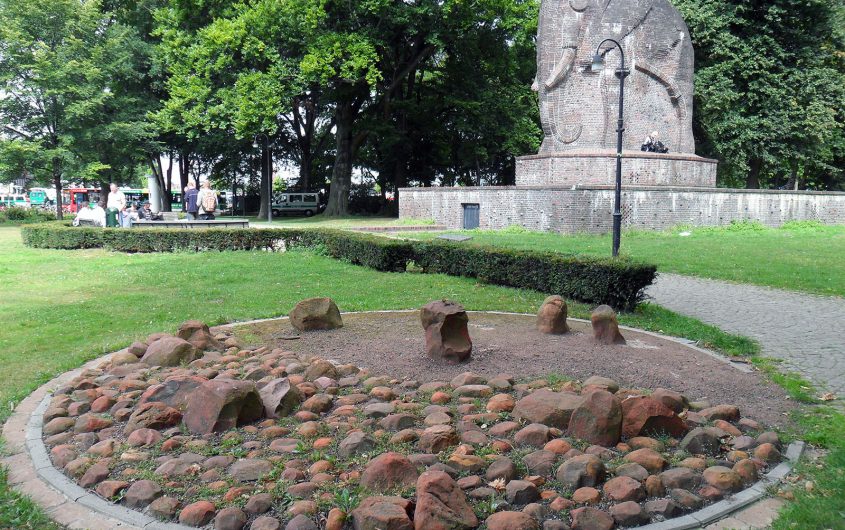
Germany’s Confrontation with Its Colonial History: Are There Lessons from Grappling with the Nazi Past?

Lily Gardner Feldman
Senior Fellow
Dr. Lily Gardner Feldman is a Senior Fellow at AICGS. She previously served as the Harry & Helen Gray Senior Fellow at AICGS and directed the Institute’s Society, Culture & Politics Program. She has a PhD in Political Science from MIT.
From 1978 until 1991, Dr. Gardner Feldman was a professor of political science (tenured) at Tufts University in Boston. She was also a Research Associate at Harvard University’s Center for European Studies, where she chaired the German Study Group and edited German Politics and Society; and a Research Fellow at Harvard University’s Center for International Affairs, where she chaired the Seminar on the European Community and undertook research in the University Consortium for Research on North America. From 1990 until 1995, Dr. Gardner Feldman was the first Research Director of AICGS and its Co-director in 1995. From 1995 until 1999, she was a Senior Scholar in Residence at the BMW Center for German and European Studies at Georgetown University. She returned to Johns Hopkins University in 1999.
Dr. Gardner Feldman has published widely in the U.S. and Europe on German foreign policy, German-Jewish relations, international reconciliation, non-state entities as foreign policy players, and the EU as an international actor. Her latest publications are: Germany’s Foreign Policy of Reconciliation: From Enmity to Amity, 2014; “Die Bedeutung zivilgesellschaftlicher und staatlicher Institutionen: Zur Vielfalt und Komplexität von Versöhnung,” in Corine Defrance and Ulrich Pfeil, eds., Verständigung und Versöhnung, 2016; and “The Limits and Opportunities of Reconciliation with West Germany During the Cold War: A Comparative Analysis of France, Israel, Poland and Czechoslovakia” in Hideki Kan, ed., The Transformation of the Cold War and the History Problem, 2017 (in Japanese). Her work on Germany’s foreign policy of reconciliation has led to lecture tours in Japan and South Korea.
The anti-immigrant riots in Chemnitz at the end of August 2018 with their expressions of hate, intolerance, and xenophobia, including Nazi salutes, have led observers to question the depth of Germany’s postwar culture of remembrance (Erinnerungskultur). How seriously, they ask, has Germany learned from its past of Nazism and the Holocaust? At the same time as the events in Chemnitz, there was a little-noticed ceremony in Berlin that dealt with another dimension of Germany’s history, its colonial past. By comparison with the Nazi past, Germany’s efforts to confront its history of colonialism in Africa are in their infancy. Are there any lessons learned from the former process that might advance the latter?
The ceremony in Berlin involved the handing over to a Namibian delegation the skulls and bones of Herero and Nama victims who had been slaughtered in Germany’s violent quelling of an anti-colonial uprising in Southwest Africa between 1904 and 1908. Four-fifths of the Herero people and half of the Nama people were murdered; some estimates show that at least 100,000 were exterminated. In July 2015, the Federal Foreign Office called the massacre a war crime and a genocide. According to the German government, moral and political responsibility follows from acknowledgement, but not legal obligations. Acknowledgement of Nazi crimes was a critical first step in Germany’s long process of reconciliation with former victim nations such as Israel, France, Poland, and Czechoslovakia/the Czech Republic. Germany’s experience with these victim countries dictates that acknowledgement of past crimes is not a singular event but has to be reiterated frequently.
As a result of the genocide committed under German colonial rule, Herero and Nama today form minority groups in Namibia and are marginalized on different levels.
– Elise Pape, former DAAD/AGI Research Fellow
Historians have referred to the slaughter as the first genocide of the twentieth century. It has also been characterized as a dress rehearsal for the Nazi genocide for the systematic way in which people were murdered and concentration camps and slave labor were used. Foreshadowing the Nazis, the skulls and bones were brought to Germany for pseudo-scientific experiments seeking to demonstrate the racial superiority of white Europeans.
The August 29 ceremony in Berlin was a religious event, organized by the German Protestant Church and the Namibian Council of Churches, with the German government represented by the Foreign Office’s Minister of State Michelle Münterfering. In 2017, the Council of the Protestant Church in Germany had issued a statement referring to its co-responsibility for the slaughter—German missionaries had failed to criticize the actions—and asking for forgiveness. The churches—both protestant and catholic—were important catalysts of Germany’s effort to rebuild relations with former enemies, especially France, Poland, and Czechoslovakia, and still have extensive ties today with their fellow churches in these three countries.
Negotiations, which began in 2015, between the German government and the Namibian government over reparations claims and the demand for a formal apology have been difficult as Germany wants to avoid a formal apology for fear of opening the door to reparations, which, it argues, would set an unfortunate precedent for Germany and for other former colonial powers. The one exception historically to issuing a formal apology and providing reparations was Israel. Yet, even in the Israeli case, not all victims were covered, so on several occasions Germany set up “special funds,” an extra-legal mechanism for providing financial support for victims not covered by Germany’s restitution and compensation laws. Such a precedent could be a way out of the legal constraints the German government feels it faces in the Namibian context. In addition, the German-Polish and German-Czech cases demonstrate that reconciliation can occur without reparations as long as there are other forms of material compensation. In both of those cases, apologies were made without reparations.
The activists engaged in the struggle for recognition and reparation of the genocide of the Herero and Nama—for the most part descendants of the survivors of the genocide themselves—have played a central role in triggering the restitutions.
– Elise Pape, former DAAD/AGI Research Fellow
Victim descendant associations representing the Herero and Nama people have opposed the negotiations; they criticize the Namibian government for inadequate representation of Herero and Nama groups. They insist that there must be a formal, public apology, preferably in the German Bundestag, followed by reparations. One Herero chief has called the negotiations “a big joke.” In January 2017, Herero and Nama representatives filed a class action suit against Germany with the U.S. District Court for the Southern District of New York, modeling their initiative on the American Jewish class action suit that resulted in negotiations over compensation for wartime slave and forced labor, and a comprehensive agreement in 2000. In that case, Germany agreed to negotiations to avoid the unpredictability of the legal route.
In the absence of reparations, the German government has provided development aid to the tune of €130 million in 2017 and 2018, but victim groups argue that the money is not directed to Nama and Herero regions. In recent negotiations, Germany and Namibia have been nearing an agreement that would label the massacre against Herero and Nama a genocide, provide aid for job training, housing, and electricity in Herero and Nama areas, and create a Foundation for the Future (Zukunfts-Stiftung) to promote remembrance and joint societal and cultural activities. Germany has a similar Foundation for the Future with Israel and the Czech Republic.
The ceremony in Berlin was a significant symbolic gesture of remembrance, a key feature of reconciliation in other German cases. A few months before the handing over of the skulls and bones, there was an equally important symbolic gesture: after many years of grassroots activism calling for name changes, Berlin officials decided to rename several streets honoring German colonizers, for example the Petersallee, which the Nazis had dedicated to Carl Peters, one of the leaders of German colonial violence in Africa. The streets will be renamed to honor Africans. These gestures are part of an array of German initiatives outlined above. However, they all tend to be discrete activities and initiatives by government and civil society, devoid of a conceptual framework (Gesamtkonzept) that connects them. In Germany’s relations with other victim nations, it pro-actively developed the framework of reconciliation. Such a move may be in the offing, for the Coalition Agreement of March 2018 committed Germany to systematically confront its colonial past. Reconciliation is an arduous and long process, but the first steps appear to have been taken.
Dr. Elise Pape was a DAAD/AGI Research Fellow in 2017, working on a project entitled, “Transatlantic Dynamics in Ongoing Postcolonial Negotiations – The Recognition of the Genocide of the Herero and Nama in Germany and in the United States.” She offers additional details about Herero and Nama activists’ struggle for recognition and reparation here.







